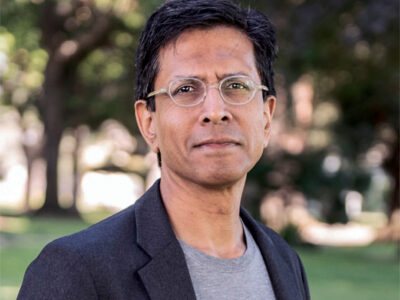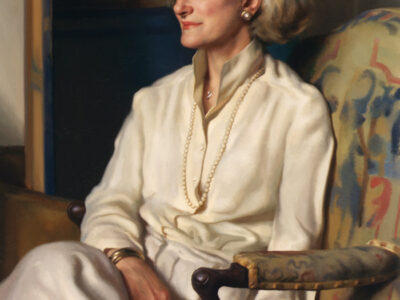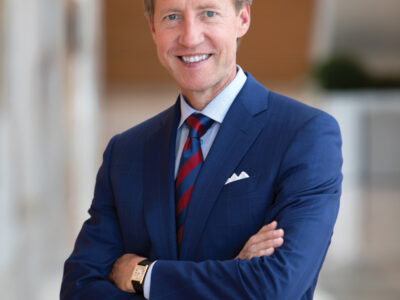Q&A | After six years as Penn’s provost—and many more as a student, faculty member, and administrator here—Dr. Robert Barchi Gr’72 M’72 GM’73 leaves this month to become president of Thomas Jefferson University. Gazette associate editor Susan Frith talked to him in July about the academic enterprise he helped shape.
What accomplishments are you most proud of as provost?
Probably the one I’m most happy about is the strengthening of academic leadership in the provost’s office and the entire academic enterprise as part of the driving force for determining the future and direction of the University—recruiting nine outstanding deans, strengthening the Council of Deans, and replacing and expanding the provostial staff. I think we now have a structure that very closely complements the president, allowing the president’s office to focus on bigger issues [while] the academic enterprise is amply handled through the provost’s office.
I’m wondering if you think it’s important for the person who fills your shoes to have a hard-sciences background since that is an area of so much growth.
I think it’s important for the provost to be someone [whose] working style complements the president’s style and whose personality fits with the president’s personality, because the two individuals have to work together hand-in-glove. The exact discipline of the provost is, to me, secondary. But you’re right, we have $700 million worth of research grants at this university, the overwhelming majority of which are in the life sciences. And we have one of the nation’s largest medical schools and one of the very few wholly owned health-care delivery systems. We have a vet school and a dental school. So it would seem to me certainly beneficial to have some person on the senior-management team in College Hall who understands the life sciences and health-care professions, but it doesn’t necessarily have to be the provost.
How important is it to get a permanent provost in place soon?
I think it is less important than it might otherwise be in that the deputy provost, Peter Conn, who is now the interim provost, has been working with me for nearly five years and has a huge amount of experience with the University throughout the previous 30 years. I think it will be a seamless transfer to have Peter in this office as the interim, and I think that provides Amy [Gutmann] with a very nice breathing space to think about how she wants to handle the provostship. I must say that Peter as an individual is incredibly well qualified for the job.
For Penn to keep its edge in the coming years, what research areas does it need to put more of its resources toward?
I think the strategic plan we went through lays that out. That plan [“Building on Excellence: The Leadership Agenda”] is something we developed as a university with consultation [from] faculty and students and staff. We thought hard about what areas we were going to focus on. One certainly is the life sciences. It’s hard to avoid that area if you’re going to be a world-class university, and it also happens to be one of Penn’s differentiating strengths.
The second area would be in various aspects of engineering we’ve identified as being key—information science and information technology; bioengineering; and nanotechnology.
A third big area to me would be The Urban Agenda, and urban opportunities for research. We need to bring [our strengths] together and really capitalize on them, and that’s what the Penn Urban Research Institute is all about [“Gazetteer,” May/June].
I think we need to look at broader global opportunities for research as well—international law and international business, which our faculty can and should excel at. [Also], social-sciences research. The social sciences here at Penn are strong but underplayed. And behind all that is the scholarly work that we do in the humanities. The grant dollars involved are not as large, but it is every bit as important to the reputation of the University as anything that’s done in the life sciences.
In The Agenda for Excellence, the University’s previous strategic plan, there seemed to be a great deal of concentration on the undergraduate experience, developing the College House system, campus hubs, around-the-clock advising, and more. In the coming years what sort of focus do you think needs to be given to graduate education?
First, we don’t want to lose our focus on undergraduate education. In addition [to the above initiatives], we should be pushing for some independent scholarly experience for all of our undergraduates, whether that’s a research or studio experience or a piece of literature or a piece of art—something that goes beyond classwork. Having said that, graduate education is an area where Penn has not in recent years played up to its level. I think we need to focus on and improve the quality of our graduate-education programs and build those areas that we think are consistent with our strategic plan, but also bring them front and center in terms of fundraising for financial aid and recognition by our trustees and by the outside community. Because they are really the heart and soul of the University and one of the major draws for the best faculty.
Are there particular schools that could be strengthened?
There are some schools where we have made major investments in recent years and have to continue to make investments. [In Engineering,] we started out somewhere in the mid-40s in ranking and felt that was one school that had a lot of upward potential, but at the same time could not ever grow to be an MIT or Georgia Tech, size-wise. So we identified four focused areas and went after them, and I think very successfully so, with construction of Levine Hall and Skirkanich Hall now going up, and, I hope, eventually, a nanotechnology facility, and the recruitment of some absolutely top-notch faculty. The ranking of the school has been rising dramatically over the past couple of years.
SAS is at the core of the University, frankly, and has made great strides over the last five years in terms of bringing its budget in line, recruiting top faculty, and beginning to deal with some of its facilities-infrastructure issues, but now is looking at major renovations in Bennett Hall and Music and several other buildings that will continue to be a challenge and financial strain.
The School of Dental Medicine is looking at major shifts in how dentists do business and the economics of doing dentistry. Our new dean, Marge Jeffcoat, has been coming to grips with these and making major progress in dealing with them.
The School of Social Work has a challenge in the next five years in identifying its future role and how it’s going to achieve that mission in the changing landscape of social-work education.
Of course the School of Medicine, while being an incredible powerhouse, is always in a financially meta-stable state, just given the state of healthcare in the United States and the reimbursement environment.
One should certainly mention the strides the Law School has made in recent years under [dean] Mike Fitts. Both with renovation of the physical plant and with the cohesion of the faculty and the growth of the faculty and the remarkable uptick in the quantity and quality of applications to the school.
With the biopond controversy behind you, how do you feel about the progress made on the life-sciences complex so far?
I would like to have seen that whole complex done before I left, and I’m saddened that we lost a couple of years in the planning process, as we did, largely because the plans themselves were misunderstood by some of the individuals in the community and at the University. It was never, ever the intention to encroach on the [nearby] biopond. This complex, when completed, will provide a new presence to that whole area by creating intentionally what will almost be a closed quad around the biopond, still making it very accessible but making it much more environmentally protected. The building will not be shading the trees; it’s been very carefully designed and cantilevered back to avoid that.
We need to build both phases of this building. Phase One, by itself, is architecturally incomplete and academically incomplete. If this project is going to really do what it could do for the University, we have to bring psychology into the context of biology and we have to complete the movement of faculty and biology and psychology into those two spaces. We have to provide additional teaching space for those sciences as well. And that will only
happen when Phase Two is finished.
What will you miss the most about Penn?
Without a doubt I will miss most of my colleagues. I will probably miss, as well, the press of undergraduates here. Jefferson is an institution with a relatively small number of undergraduates, and I found that during six years in the provost’s office, the experience of interacting with our undergraduates to be a very invigorating and renewing experience for me.




